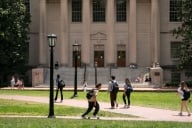You have /5 articles left.
Sign up for a free account or log in.
The United States Supreme Court's historic June 15 decision about LGBTQ workers' rights had its first impact on how courts define sex discrimination at colleges.
The U.S. Court of Appeals for the 11th Circuit concluded that Title IX of the Education Amendments of 1972, the law prohibiting sex discrimination at federally funded institutions, also protects transgender students from discrimination based on their identity, said the court's Aug. 7 decision, written by Judge Beverly Martin.
"We conclude that Title IX … prohibits discrimination against a person because he is transgender, because this constitutes discrimination based on sex," Martin wrote.
Martin drew upon the Supreme Court's new interpretation of "sex," which includes sexual orientation and gender identity, and decided a transgender high school student in Florida could sue his former school district for its bathroom policy. The policy blocked the student, who identifies as male, from using the boys' bathroom because he was not biologically male and required him to use a female or gender-neutral bathroom, court documents said.
The decision could impact how colleges in the 11th Circuit, which encompasses Alabama, Florida and Georgia, implement bathroom policies and could subject colleges within the states to Title IX lawsuits related to discrimination against transgender students more broadly.








